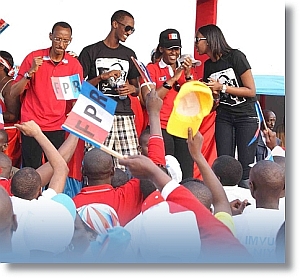Uganda 2011: Tips for the Opposition

 |
| Rwanda's Kagame: Africa's democracy is wanting Photo courtesy |
Many governments in Africa today employ a liberal democratic rhetoric but practice otherwise. Therefore, in aggregate terms, one can say that elections are good macro indicators of democratic progress but not enough, even though they can help us explain generic and confirmatory trends in micro indicators inured toward reading the politics of a country. For a developing democracy, micro indicators provide more accurate variables because they directly measure grassroots units and that’s where political policy needs to make most impact. Successful transfer of instruments of power for instance, cannot tell us much about the legal, political frameworks and security circumstances under which elections were held. However, voter turnout, vibrant civic awareness, acceptance of electoral results by the opposition and incumbent especially in an event of a defeat to either of the two, should be better micro-indicators of progressive politics.
It is absolutely useless, unless a regime cares less about wastage of resources, to hold elections under conditions which do not warrant meaningful and fair participation of its citizenry in the electoral process. Of course regimes are primarily concerned with power consolidation, and they will do everything within their reach to win an election so as to stay in office—thus the contracting democratic space. A keen observer of electoral democracy in Africa will easily point out that it is unusual for an incumbent to loose an election. This fear has pushed opposition leaders to develop new strategies of winning elections thus pre election coalitions. However, the extent to which coalitions have been effective in terms of promoting democratic governance in the African context, still needs to be carefully studied.
Unlike the recent coalitions in the UK, Kenya and Zimbabwe, coalitions have generated very interesting outcomes, which urgently call for Ugandan political parties to study more keenly, especially when planning a coalition. Theoretically, it appears that the core motivation for entering into coalitions is driven by perceived benefits of partnership, which come before or after elections. According to Sona Golder, parties have to weigh whether going into a coalition will give them more votes, if its membership will have access to office or if a coalition will give them space to influence policy. In South Korea, Sona points out that term limits make coalitions attractive, because a ‘leader of one party can throw his support behind a candidate of another party in exchange for similar support in future elections.’ This means that an opposition party or a ruling party is likely to go into coalition if the perceived benefits of going into one will increase its chances of taking or retaining office, so that it can advance policy and mobilize a critical support base.
In Uganda, the Inter Party Coalition exists—to gather support across the country and ostensibly defeat the ruling National Resistance Movement. Although, the ruling party is still the likely winner in 2011, it needs to reform its ranks and do some house cleaning for it to be assured of a decisive majority. Whatever case it is, considering the current configuration of Uganda’s political map, a coalition still presents a strong strategy to both the opposition and ruling party to cause change. Rhetoric of a stolen election in Uganda is not what the ruling party wants to see post 2011 because it undermines its legitimacy locally and internationally. It is likely that in the event of a boycott by opposition parties (opposition parties are weighing the possibility of a boycott), President Museveni will go to polls alone---Nkurunziza style, but this will effectively undermine his statesmanship and legitimacy.
At the moment, a boycott as a strategy to de-legitimize electoral results is not a convincing tool either, as the ruling party can build legitimacy through domestic programs after winning a ‘stolen’ election. Given that Uganda does not have presidential term limits, a large number of swinging voters, Kenya and Zimbabwe scenarios inform us that, the battle to win legitimacy and the vote, is most crucial in the event political parties enter into coalition. Therefore, winning the vote and legitimacy to govern a coalition presents the most feasible and prospects of political value for both the opposition if it wins and the ruling party if it retains power.
If the NRM went into a coalition with another party, whatever the opposition does, it won’t dislodge the ruling party from office and will not undermine its legitimacy either. Imagine, a National Resistance Movement coalition, with another party in 2001 and 2006. Besigye’s Forum for Democratic Change would have required an enormous amount of evidence to suggest that elections were fraudulent, thereby undermining the legitimacy of the ruling party then. (A wide section of election observers did describe the 2001 and 2006 elections as lacking fundamental elements of fairness). However, a coalition makes it harder for the ruling party to win a free and fair election too.
Political theory and evidence from other countries present lessons for the opposition parties in Uganda, that a coalition is the immediate and effective strategy needed so as to cause change of guards, but the opposition needs to remember that it works for the ruling party too if they decided to get into one. In the event that elections turn out to be free and fair, the battle to win 2011 presidential elections will largely be determined by how effectively the logic of coalitions is exploited by either the opposition or the ruling party.
By Stephen Okello.
Stephen Okello [email protected] is a Policy Researcher.
